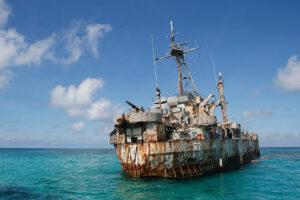France worried about latest South China Sea incident
FRANCE on Monday expressed concern over China’s blockade of a Philippine resupply mission in the South China Sea on June 30, as it reiterated support for a 2016 arbitral ruling on the sea dispute in Manila’s favor.

By Kyle Aristophere T. Atienza, Reporter
FRANCE on Monday expressed concern over China’s blockade of a Philippine resupply mission in the South China Sea on June 30, as it reiterated support for a 2016 arbitral ruling on the sea dispute in Manila’s favor.
In a statement, the French Embassy in Manila said it is opposed to any use of threat, asking all parties to respect international law.
“Following the recent incidents in the South China Sea, we express our concern and call for respect for international law and the resolution of disputes through dialogue,” it added.
The landmark ruling that voided China’s claim to more than 80% of the South China Sea will mark its seventh year on July 12.
In the ruling, a five-member arbitration court based in the Hague affirmed Philippine sovereign rights in areas within its 200-nautical mile exclusive economic zone (EEZ).
It said China violated the Philippines’ sovereign rights in its EEZ by building artificial islands and by failing to prevent Chinese fishermen from fishing in the zone.
The tribunal said China should comply with UNCLOS and honor the award. China has ignored the decision, calling it void.
The Chinese Embassy in Manila did not immediately reply to a Viber message seeking comment.
On Friday, the Armed Forces of the Philippines said it had spotted at least 48 Chinese fishing vessels near Iroquois Reef, south of gas-rich Recto Bank, and five Chinese Coast Guard and People’s Liberation Army Navy vessels near Sabina Shoal.
“The Marcos administration is casting a wide net for support in the West Philippine Sea,” Raymond Powell, a fellow at Stanford University’s Gordian Knot Center for National Security Innovation, said in an e-mail.
Not only has it reinvigorated its alliance with the US, “it has also deepened its security ties with other regional US allies and has reached out to like-minded European nations both individually and collectively through the European Union (EU),” he added.
Mr. Powell said all these increase Manila’s leverage in negotiating with China, which he said prefers to isolate smaller countries “so as to overwhelm them with size and strength.”
‘HUMANITARIAN DRILLS’
In an unprecedented move last month, India called for adherence to the 2016 arbitration award.
The change in New Delhi’s stance was contained in a joint statement issued by India and the Philippines after a bilateral cooperation meeting.
Mr. Powell said India’s move is a “significant moral victory” for the Philippines in its struggle to hold off China’s strong-arm tactics.
He noted that India is careful not to take sides in the power rivalry between the US and China. “At the same time, it recognizes that China poses the only real threat to its interests, so supporting the Philippines gives New Delhi an opportunity to take a principled stand on maritime issues while avoiding taking America’s side outright.”
India is a member of the US-led Quadrilateral Security Dialogue (QUAD), which also includes Japan and Australia.
The US, Japan, Australia and the Philippines, which are seen building a QUAD-like security cooperation, held their first defense talks as a group in Singapore last month, agreeing to step up cooperation in the South China Sea.
“Manila’s subjective willingness to reshape the regional geopolitical landscape has been strong, but apparently that must be dependent on some other state or international actors such as the US, Japan, the EU, the United Nations and so on, which may in return cause more direct and assertive actions launched by Beijing as counter-measures,” Kwei-Bo Huang, director of Center for the Global and Regional Risk Assessment at the National ChengChi University in Taipei, said in a Facebook Messenger chat.
He said it was unclear whether other members of the Association of Southeast Asian Nations (ASEAN) agree on Philippine efforts to “draw more foreign influences in the area.”
“If the decision of the Philippines will be very effective, then most of the ASEAN member states would give a stronger endorsement,” he said. “But if the decision will result in greater instability in the area, then the collective resolve of the ASEAN member states will be weakened obviously, not to mention the possible braking role to be played by Cambodia and Myanmar.”
Mr. Huang said China might soon send more vessels to disputed parts of the sea “in the name of ‘peaceful’ or ‘humanitarian’ drills.” “Mainland Chinese coast guard and fishing vessels may become a tool for technical blocking against the routes of Philippine vessels in the sea.”
Mr. Marcos Jr., 65, is veering away from the foreign policy of his predecessor Rodrigo R. Duterte, who led a pivot to China in 2016 in exchange for investment pledges, few of which had materialized.
The Philippine leader is seen restoring — and boosting — the country’s alliance with the US and its allies.
In February, Mr. Marcos gave the US access to four more military bases on top of the five existing sites under their 2014 Enhanced Defense Cooperation Agreement — a move that has angered China.
At a bilateral meeting in Brussels last month, European and Philippine officials agreed to form a Subcommittee on Maritime Security to ensure freedom of navigation and overflight in the Indo-Pacific region.

















